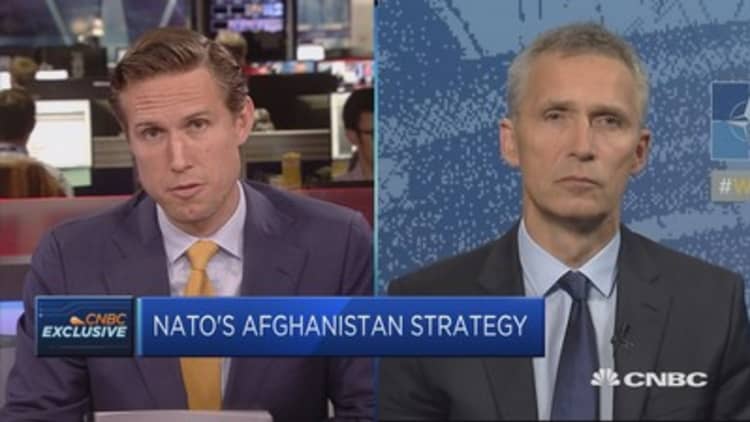President Donald Trump, frustrated that the U.S. is "losing" in Afghanistan, is considering replacing the American military commander leading the campaign, according to a report.
According to NBC News, the president during a July 19 meeting "repeatedly suggested" to his military advisors that they should replace Army Gen. John Nicholson, the current top U.S. commander of coalition forces in Afghanistan. It cited senior administration officials.
Previously, Nicholson requested the administration increase the number of U.S. soldiers fighting the battle against the Taliban in Afghanistan. Nicholson formally assumed command of the U.S. forces in Afghanistan in March 2016.
On Thursday, Senate Armed Services Committee Chairman John McCain (R-Ariz) expressed support for Nicholson in a statement, saying the general "has served our country with honor and distinction for 35 years. He has earned the trust and admiration of those he has served with. And he has earned my full confidence."
McCain also urged Trump "to resolve the differences within his administration as soon as possible and decide on a policy that can achieve our national security interests in Afghanistan and the region. If the president fails to do this by the time the Senate takes up the defense authorization bill in September, I will offer an amendment to that legislation, which will provide such a strategy."

Some have suggested what's needed is to consolidate the management structure of the U.S. campaign in Afghanistan to something akin of a Gen. Douglas MacArthur approach.
"There are too many cooks in the kitchen — and the cooks change shift annually," former Blackwater CEO Erik Prince wrote in an op-ed in the Wall Street Journal back in May. Prince, who served as a Navy Seal in the 1990s, pointed out in the Journal piece that "the coalition has had 17 different military commanders in the past 15 years, which means none of them had time to develop or be held responsible for a coherent strategy."
The U.S. military has been fighting in Afghanistan since 2001 but the security situation in the country remains dangerous and increasingly volatile. The U.S. has spent well over $800 billion fighting in the conflict and there have been more than 2,400 U.S. military fatalities and tens of thousands of soldiers wounded.
On Wednesday, two American service members were killed in a suicide attack in Afghanistan. Last week, at least 35 people were killed in a bomb attack in the capital Kabul that was claimed by the Taliban.
"We aren't winning," Trump reportedly said during the meeting. "We are losing."
Similarly, Defense Secretary James Mattis testified to the Senate Armed Services Committee in June that the U.S. was "not winning in Afghanistan," after about 16 years and he indicated that a winning strategy will mean a "change in our approach" and an "era of frequent skirmishing."
Trump inherited the war from two previous presidents but lawmakers, including Arizona Republican McCain, have been critical of the current administration for failing to come up with a new strategy for the Afghanistan conflict. During his June testimony to the Senate committee, however, Mattis indicated Congress should have the new strategy by mid-July but there's still debate within the administration over what the new strategy should be.
NBC News said the president made the suggestion about replacing Nicholson to Mattis, a retired four-star Marine Corps general, and Joseph Dunford, chairman of the Joint Chief of Staffs. It also reported that Trump vented to Mattis that he's given military authority to the retired general to make changes in the Afghanistan strategy but it still didn't change the situation for the better.
The Pentagon didn't return calls for comment.
"We can't blame Trump or the Trump administration for taking so long to come up with a policy because in my view there really are no good policies for Afghanistan at this point," said Michael Kugelman, a deputy director and senior associate for South Asia at the Wilson Center, a Washington think tank.
Kugelman added that the president probably has reason to be frustrated because he's been shown some ideas of things that have already been tried by previous administrations — and that haven't worked.
"Most people agree there's no military solution to the war," said Kugelman. "So sending more troops may have more tactical advantages, but ultimately it won't win the war."
Another option that has been weighed by previous administrations is a political solution to the conflict in Afghanistan, including negotiation with the Taliban, a fundamentalist group funded in part by money from Pakistan. Kugelman doesn't believe the Taliban would negotiate with the U.S. since it "controls more land than it has at anytime since the war started."
Meantime, Prince, the former Blackwater CEO, believes there's still a way to turn things around, and not only with "an American viceroy" or MacArthur model. Besides consolidating the leadership structure of the U.S. campaign in Afghanistan, he sees private military services having a role to support the Afghan security forces and fix some of the problems dogging the current effort.
Specifically, Prince wrote in the Journal op-ed about using "cheaper private solutions to fill the gaps that plague the Afghan security forces, including reliable logistics and aviation support." The Military Times newspaper reported Wednesday that the former Blackwater CEO had already presented "a business proposal offering a 'turn-key composite air wing' to help the fledgling Afghan air force fight against the Taliban and other militant groups."
Prince wasn't available for comment at deadline.
WATCH: Afghan security environment a 'stalemate'



